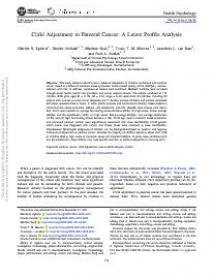Child Adjustment to Parental Cancer : A Latent Profile Analysis
Objective: This study aimed to identify latent classes of adjustment in children confronted with parental cancer, based on profiles of traumatic stress symptoms, health-related quality of life (HRQoL), and satisfaction with life. In addition, correlates of classes were examined.
Method: Families were recruited through social media, health care providers, and cancer support centers. The sample consisted of 175 children (52% girls, aged M = 11.98, SD = 3.20, range = 6–20 years) from 92 families, including 90 parents with a current or past cancer diagnosis and 71 healthy parents. Children and parents completed self-report questionnaires at home. A latent profile analysis was conducted to identify classes based on child traumatic stress symptoms, HRQoL, and satisfaction with life.
Results: Four classes were identified, which were labeled (a) average functioning across domains (64%); (b) high stress, below-average HRQoL and life satisfaction (14%); (c) high stress, below-average HRQoL, and average satisfaction (11%); and (d) high functioning across domains (11%). Child age, parent traumatic stress symptoms, and perceived parental warmth were significantly associated with class membership. Child gender, which parent was diagnosed with cancer, and illness phase were unrelated to class membership.
Conclusions: Meaningful subgroups of children can be distinguished based on positive and negative indicators of adjustment to parental cancer. Whereas the majority of children appear to adjust well, 25% of children display high levels of traumatic stress and impaired HRQoL, in some cases combined with low life satisfaction; these children may need specific attention to improve adjustment in the long term.
In: Health Psychology ; ISSN: 0278-6133 | 40 | 11 | 774-783
https://doi.org/10.1037/hea0001099


